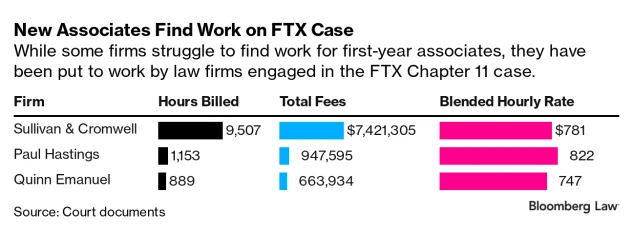How did FTX get "scammed" out of $120 million by law firms in three months?
Source: Odaily Planet Daily
As the FTX bankruptcy restructuring progresses, the increasing legal costs have drawn significant attention.
According to documents submitted by FTX advisors on June 15, the total expenses for FTX from February 1 to April 30 amounted to $121.8 million, including various expenditures such as legal, consulting, and financial service fees.
Among them, Sullivan & Cromwell law firm charged $37.6 million, accounting for 30.9% of total expenses; investment bank Jefferies charged the least, with only over $700,000, which is 0.6% of total expenses; Alvarez and Marsal's restructuring consultants charged $37 million, which includes $1.1 million in expenses—comprising $51,225 for meals, $149,155 for lodging, and $1,995 for other miscellaneous expenses; FTI Consulting spent approximately 686.8 hours on a workflow named "Exchange Restart" and charged $761,997.70.
It is important to note that, according to U.S. bankruptcy law, the above expenses have a higher priority for repayment in the future than unsecured general claims prior to filing for bankruptcy, meaning that various management fees will be settled before compensating creditors.
Of course, FTX's current CEO John J. Ray III, who charges $1,300 per hour, has also made some contributions. At a hearing in Delaware in May, FTX's lawyer stated that over $7.3 billion in assets had been recovered, an increase of $800 million compared to January—this is undoubtedly a positive signal for creditors. Additionally, John J. Ray III confirmed the FTX 2.0 plan, which aims to restart FTX.
However, the transparency and reasonableness of the related expenses remain highly controversial, and John J. Ray III has clearly not performed well in this regard.
Recently, Bloomberglaw reporter Roy Strom wrote about the hidden issues behind FTX's legal expenditures, and Odaily Planet Daily has compiled the article as follows:
For law school graduates about to join the largest law firms in the country, there is considerable anxiety. Some firms are laying off lawyers and delaying the start dates for associate attorneys, hoping to cut costs amid a significant decline in corporate transaction volumes. However, there is one area where some large law firms are continuously recruiting new staff: bankruptcy cases.
New lawyers from firms like Sullivan & Cromwell (FTX's legal team), Quinn Emanuel Urquhart & Sullivan (FTX advisors), and Paul Hastings are seeing an increase in billable hours on major bankruptcy cases. According to registration records from the New York State Bar Association, some of these lawyers will not become licensed attorneys until May or June of this year. Many of these 2022 law school graduates have already begun billing clients even before obtaining their licenses.
For example, at Sullivan & Cromwell, at least 33 graduates from the class of 2022 have started billing hours for the FTX bankruptcy case. According to court documents submitted by the firm, these new lawyers typically charge $775 per hour, and they have worked over 9,500 hours, totaling more than $7.4 million in fees.
In just six months, the 33 new lawyers at Sullivan & Cromwell have generated an average of approximately $225,000 in revenue—this case is expected to continue for some time, and they will soon contribute further profits to the firm—helping each equity partner at Sullivan & Cromwell earn nearly $6 million in profit. The fees charged by the new lawyers are just a small part of the $80 million that Sullivan & Cromwell billed FTX.
In fact, many corporate clients refuse to pay for new lawyers—they believe that they should not have to pay while "junior lawyers" are learning the business from senior lawyers. In New York, unlicensed graduates work for firms while studying for the bar exam or waiting for the results of the exams held in February or July of last year.
Legal ethics attorney Jan Jacobowitz stated that law school graduates can conduct research, document review, and proofreading, but they cannot provide legal advice to clients. She noted that unlicensed graduates must work under the supervision of a licensed attorney. "According to the rules of professional conduct, law graduates are considered 'non-lawyers.' The rules require that law firm management establish policies and procedures to ensure that all lawyers and non-lawyers comply with legal ethics standards."
Specifically at Sullivan & Cromwell, the most efficient lawyer involved in the FTX case is not yet registered as a licensed attorney in New York. After passing the bar exam in July 2022, she has been working "night shifts" (implying unauthorized practice). Court records show that in February alone, this lawyer worked an average of over 7 hours per day; over six months, her billable hours exceeded 950, earning the firm $740,000.
Court documents also reveal that another new lawyer at Sullivan & Cromwell passed the New York bar exam in February 2022 but has not yet obtained a New York license; however, she charges $1,310 per hour, significantly higher than the $775 charged by other new lawyers. Her rate is the same as that of another lawyer who graduated from law school in 2019 and obtained a license in 2020, while lawyers who graduated in 2021 typically charge $960 per hour.

Sullivan & Cromwell is not the only firm deploying new lawyers in Chapter 11 bankruptcy cases.
Quinn Emanuel has been hired as special litigation counsel in the FTX case, with 7 lawyers who obtained their licenses in 2023. Court documents show they charge $747 per hour, generating nearly $665,000 in revenue, while the firm refers to unlicensed law graduates as legal assistants, charging $508.50.
Paul Hastings also has two new lawyers on the FTX case, who are attorneys for the creditors' committee. In March of this year, Paul Hastings' new lawyers worked 243 hours, averaging nearly 8 hours per day, including weekends. Currently, Paul Hastings' attorney fees have increased from $755 per hour in February to $855; to date, the firm's charges have approached $950,000.
The question arises: is it too late to switch to bankruptcy law now?











